牛津英语7A Unit 2 vocabulary
牛津英语7AUnit2 vocabulary

(3) the school day, favourite lessons,
spend….doing
(4) go to the Reading Club, play volleyball, Amy, a member of …, a good swimmer, have a good time
Presentation
listen to Shirley: Yes. We should _______
her. She’s always right!
中考题型链接
根据所给单词的首字母或汉语意思 填空,每格一词:
laying computer games. 1. Simon likes p______ 2. Do you eat l____ unch at home or at school?
a badminton
a radio
a model pห้องสมุดไป่ตู้ane
some newspapers
Read and learn the new words
model 模型,模特儿 newspaper 报纸 should much 应当,应该 许多的,大量的;
非常;更加
Millie is telling Amy what activities Tommy
3. Annie likes swimming very much, and
she is a good s_______. wimmer
4. Peter listens to the r____ adio every day. 5. They don’t write letters to each other. They send e_____ -mailsto each other. 6. Ricky makes model _____ (模型)planes
英语初一上译林牛津版unit2vocabulary讲学稿

英语初一上译林牛津版unit2vocabulary讲学稿课时第4课时课题Vocabulary课型新授教学目标知识目标Discussthereasonsforone'slikesanddislikes能力目标Usevocabularytotalkaboutleisureactivities.情感目标Touseverbsandnounstotalkaboutleisuretime教学重点Thedifferencebetweenmanyandmuch预习导学依照所提供的首字母及中文提示写出单词。
1.Myfatherlikesreading___________(报纸)everymorning.2.Helikestomakea___________(模型)plane.3.Simonwrites____________(信)tohisfriendeveryweek.4.Everystudent___________(应当)studyhard.5.DoesShirleylike_________(看)TV?教学过程Step1Revision1.Checkthehomework(makesentences)2.HaveacompetitionStep2Lead-in1.ShowthepicturesatpartAExplain:listenwritewatch.Theletter“t,w”issilent.2.Booksopen!PartAthecorrectverbsunderthepictures.Step3Pairwork1.AskandanswerquestionsinpairsaccordingtoPartA2.Askaboutstudents'ownactivities3.Askandansweringroupsoffour.Step4Lead--in1.wetalkaboutTommy'sandourdailyactivitiesinorafterschoo l.Look!ThisisAmy'scousin.ShewanttoknowwhatAmyandherfriendsdoafterschool.Nowpleasereadtheirconvers ation.2.PartBSsdothetaskontheirown.3.Checktheanswer.4.Repeataftertheteacher.5.Readinpairs.6.Haveacompetition.7.Somepairsactbeforeclass.8.Haveasurvey.Whatdoyouandyourfriendslikeordisliketodo.Step5HomeworkWriteashortpassageabout “Whatdoyouandyourfriendslikeordislike?”课内研讨题【一】选择填空。
牛津英语7A Unit2 vocabulary完美版

after school. 7. My father always reads n_e_w__s_p_a_p_e_r_s
(报纸)after supper.
school? 3. 3. Annie likes wswimimmmering very much,
and she is a good s_______.
4. Peter listens to the r_a_d_i_o every day. 5. They don’t write letters to each
Amy: No, she doesn’t. She _re_a__d_s
books.
Shirley: Does Sandy l_i_s_te_n__t_o music? Amy: Yes, she does. She also _p_l_a_y_s
badminton.
Shirley: Do Simon and Daniel
8. My mum says we s_h_o_u_l_d_n_’_t (不应) watch too much TV.
9. Daniel p__ra_c_t_i_se_s_ (练习)playing badminton every Friday.
10. Millie and her classmates do afterschool _a_ct_i_v_it_ie_s_ (活动) at 4 p.m. in the afternoon.
play badminton
listen to the radio
牛津译林初中七年级英语上册Unit 2 Let's play sports》Study skills
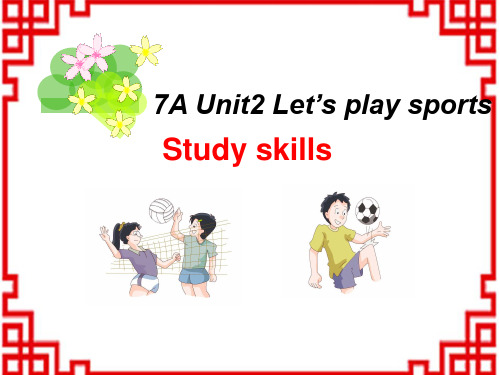
U but cup duck run sun
/ʌ/
Would you please help the words find their homes?
clock club fun get happy listen bad often swim well dad pick left study fox
[ 'pensəl ]
pencil
hey. It’s not easy to find a pen. You can sit here and use mine.
I
[ i]
[ 'lisən ]
film
listen
bill
[ swim ]
Unluckily, the cup was broken (坏了) and the map was torn (撕碎), but the dog ran
away.
[ʌ]
[ klʌb ]
club
[ fʌn ]
fun
mum gun just luck
Unluckily, the cup is broken (坏了) and the map is torn (撕碎), but the dog runs
risk
swim
silk
At that moment, a dog jumped out of the box and ran to the man. It could not stop! How dangerous!
X
[ɔ ]
[ 'dɔktə ]
doctor
[ 'ɔfən ]
often
hot job top rock
I
Unit 2 重点词组 牛津译林版英语七年级上册
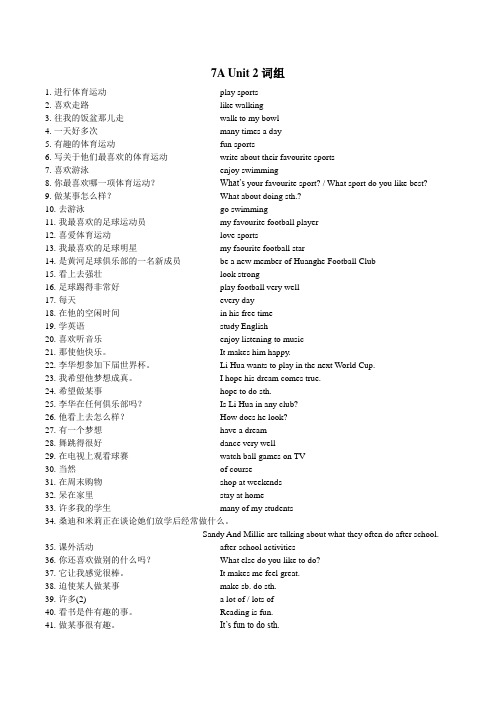
7A Unit 2词组1.进行体育运动play sports2.喜欢走路like walking3.往我的饭盆那儿走walk to my bowl4.一天好多次many times a day5.有趣的体育运动fun sports6.写关于他们最喜欢的体育运动write about their favourite sports7.喜欢游泳enjoy swimming8.你最喜欢哪一项体育运动?What’s your favourite sport? / What sport do you like best?9.做某事怎么样?What about doing sth.?10.去游泳go swimming11.我最喜欢的足球运动员my favourite football player12.喜爱体育运动love sports13.我最喜欢的足球明星my faourite football star14.是黄河足球俱乐部的一名新成员be a new member of Huanghe Football Club15.看上去强壮look strong16.足球踢得非常好play football very well17.每天every day18.在他的空闲时间in his free time19.学英语study English20.喜欢听音乐enjoy listening to music21.那使他快乐。
It makes him happy.22.李华想参加下届世界杯。
Li Hua wants to play in the next World Cup.23.我希望他梦想成真。
I hope his dream comes true.24.希望做某事hope to do sth.25.李华在任何俱乐部吗?Is Li Hua in any club?26.他看上去怎么样?How does he look?27.有一个梦想have a dream28.舞跳得很好dance very well29.在电视上观看球赛watch ball games on TV30.当然of course31.在周末购物shop at weekends32.呆在家里stay at home33.许多我的学生many of my students34.桑迪和米莉正在谈论她们放学后经常做什么。
Unit2+Vocabulary词汇课件2023-2024学年牛津深圳版英语七年级上册

market guitar go to bed get up grade
Vocabulary
C1 Here are some sentences from the article on page 17. Do you know the meanings of the words in italics? Circle the correct answers.
1 Classes start at 8 a.m., and I am seldom late.
a often
b not often
2 We have our morning break at 9:50 a.m. a a short time between lessons b a short holiday
What do you usually do after work? 我们通常开汽车去旅游。
We usually go travelling by car. 今天是个不同寻常的日子。
Today is an unusual day. 我出生在一个普通人家。
I was born in a usual family.
3 When the bell rings, I run to the playground with my
best friends Tom and Jack.
a makes a sound
b is quiet
4 Afternoon classes end at 3:30 p.m.
a stop
b begin
seldom
adv. 不常;很少
seldom 是频度副词,意思是“很少,罕见,难得”。
seldom 具有否定意味,在句中一般位于系动词、情
Unit2Vocabulary词汇课件牛津深圳版英语七年级上册

just
恰好
Thank you !
6、go to bed 去睡觉(fall asleep 睡着) 7、get up 起床(wake up 叫醒) 8、on foot 步行 9、be full of energy充满活力(=be filled with ….) 10、get... ready for 准备好 11、put on 举办,上演,穿上 12、clean up 打扫干净(tidy up整理) 13、pick up 取,摘,接sb.
4、develop v. 发展
developed adj. 发达的 developing adj. 发展中的 development n. 发展 developed country 发达国家 developing country发展中国家
5、skill n. 技能
skilled/ skillful adj. 熟练的
6、teen adj. 青少年的
数字+teen:fifteen, sixteen teenager n. 青少年(13-19)
7、greeting n. 问候
greet v. 问候
8、energy n. 精力
energetic adj. 精力充沛的 powerful adj.
9、luckily adj. 幸运地
新G7U2 School Life
Words and phrases
1、activity n. 活动
active adj. 积极的
2、practise v. 练习
practice n. 练习 practise doing sth.练习做某事
3、solve v. 解决
solution n. 解决办法
mood 情绪,心情
苏教版(凤凰)牛津英语教案7aU3vocaBUlary录教案[五篇材料]
![苏教版(凤凰)牛津英语教案7aU3vocaBUlary录教案[五篇材料]](https://img.taocdn.com/s3/m/3880bd7ab207e87101f69e3143323968011cf4b1.png)
苏教版(凤凰)牛津英语教案7aU3vocaBUlary录教案[五篇材料]第一篇:苏教版(凤凰)牛津英语教案7a U3 vocaB Ulary 录教案苏教版(凤凰)牛津英语教案20117A Unit 3 Let’s celebrate!Vocabulary 教学目标:1.知识目标1)掌握一年中不同节日的说法。
2)学习不同节日做什么和吃什么。
2.能力目标能从不同角度描述人们是如何庆祝不同节日的。
教学重难点:学会谈论在不同的节日里人们做什么和吃什么。
Step 1.Revision T: Hi, everyone!Nice to see you st class, we learned something about Halloween.First, let’s have a revision.When is Halloween?Who celebrates Halloween?How do they celebrate it?What do they eat? Step 2.Free talk about some more festivals with some pictures.Picture 1: Christmas T: Which festival is it? S: It’s Christmas.T: When is it? S: It’s on December 25th.T: What do people do at Christmas? Help students answer like this: People get cards and presents.Picture 2: turkey T: What’s this? Do you know? It’s turkey.Then ask students to read after the teacher.T: When do people eat turkey?S: Thanksgiving Day.Picture 3: Dragon Boat Festival T: What about this picture? Do people eat turkey at this festival? S: No.T: What do people eat? Look at the pictures.They eat rice dumplings.Ask the students to read after the teacher.T: Which festival is it? S: It’s Dragon Boat Festival.T: What do people do at this festival? Picture 4: Mid-Autumn Festival T: Which festivalis it? S: Mid-Autumn Festival.T: What do people eat and what do people do at Mid-Autumn Festival? Do you know?Look at the pictures and discuss with your partner.T: Good.People eat mooncakes.And they see the moon in the open air.They tell stories about Chang’e.Step 3.Practise T: Now you know what people do and eat at different festivals.Let’s finish Part B on page 44.Then check the answers.Step 4.Talk about the festivals in Part A on page 44 Show the students some pictures.T: You have done a good job.But do you know these festivals.I think all of you know them.But do you know their English names? Read after me, please.Read all the festivals: New Year’s Day Teachers’ Day May Day National Day Children’s Day Then ask students to match the dates with the festivals.Step 5.Practise How do people celebrate the festivals? On _____________, children can get presents.They are very happy.On _____________, teachers get cards and flowers from their students.On _____________, people usually have a party.On _____________ and ____________, we have a 7-day holiday.We don’t go to school.Step 6.Finish Part A on page 44.Step 7.Consolidation 1.看图片找不同.2.Choose one of the festivals and make up a dialogue like the model in pairs.νWhen is …? ν What do you do on that day?/ What do you eat on that day? Step 8.Summary 这节课我们学习了很多节日的英语表达法;还学习了如何简单描述人们是如何庆祝这些节日的,例如人们做什么吃什么.特别要提醒同学们儿童节和教师节的拼写.Step 9.Homework 1.Review the new words and the festivas.2.Choose one of the festivals and make up a new dialogue.第二篇:苏教版(凤凰)牛津英语教案6A U8教案苏教版(凤凰)牛津英语教案20116A Unit 8 教学方案第一部分简要提示一,年级:6年级二,Unit 8 三,课题:Review and check四,课型:单元复习课五,教学目标:通过复习,要求学生掌握四会单词,词组和句子。
Unit2知识点 牛津译林版英语七年级上册

7AU2知识点New words and expressions:1.walking/swimming/singing /dancing is my hobby.2.Really? /He’s really a paper tiger.3.a bowl of milk4.three times/once a year/twice a weekHow many time—once/three times.How often do you go home? Once a week.5.play tennis/basketball/volleyball/table tennis6.enjoy the school life/working in Beijing/living in Shanghai/myself(玩的开心)7.go swimming/fishing/shopping/walking/running8.eleven football players9.He’s in the football team=He’s a member of the football team10.in the Computer /Reading Club11.He’s free/He’s very busy12.I hope+ (I hope everyone swims very well)I hope to do sth (I hope to go to Beijing by plane.)13.Your dream comes true.14.He’s good at drawing—He draws well15.at weekends—at the weekend (Saturday and Sunday)16.Can I borrow your books? Of course.Here you are17.else What/whatwhere else can you see..?Is there anything else in today’s newspaper?Other+ other books18.a lot of/lots of =many or muchI have a lot of books to read.There’s lots of milk in the glass.19.have fun(in doing sth)/have a good timeHe has fun (in)playing games.20.talk about /of talk to /with me talk about the filmHe’s talking to us about the story21.a few basketball matches22.The twins are our heroesLanguage points:1.Do you have any books ?I don’t have any books2.I walk to school=I go to school on foot.He takes a bus to work=He goes to work by bus.Kate rides a bike to school=Kate goes to school by bike.3.many times a day/five times a week4.What’s your favourite sport? I like playing volleyball5.He often play basketball after school.6.I’m 12 years old.What about him/her/them?7.every week/day/year/Monday this week/evening8.my favourite football star9.She’s in the football club=She’s a member of the football club.10.He works in Beijing.He studies at No1 Middle School.11.He looks strong/ He feels happy/ Music sounds beautiful.12.in his free time,she studies English.13.He also enjoys listening to music=He enjoys listening to music ,too.14.It makes him strong. Listening to music makes her happy.15.He wants to play tennis with me in the next World Cup16.This is our English teacher. Who is this ?That’s Jim’s book. Whose book is that?He’s a teacher What’s he? What does he do?17.He plays tennis at school.What does he do at school?Where does he play tennis?18.He gets up at six. He doesn’t get up at six.Does he get up at six? What time does he get up?19.They do housework at home.They don’t do housework at home. Do they do housework at home? Where do they do housework?20.likes/plays, study—studies fly-flies watches/washes/dresses/goes/does21. ___Jim__ (get) up early? No,______.22.___the twins___(play) football? Yes,____.23.They___(not,read) English at home.He___(not,watch) TV at school.24.When______Sam______(go) to bed? He___(go) to bed at six.25.some of the students/many of the studentsSome of us, all of us26.He doesn’t like sports very much.27.What do you do after school?28.What else does he do?Who else can you see?29.Sometimes I listen to music.30.It makes me feel great.31.He plays volleyball with us/her/them32.read a lot of interesting books /newspapers33.Reading English is fun/interesting.My brother likes basketball very much/best.35.I often play volleyball with my friends after school.。
牛津上海七年级英语下知识点复习汇总Unit 2 Going to see a film
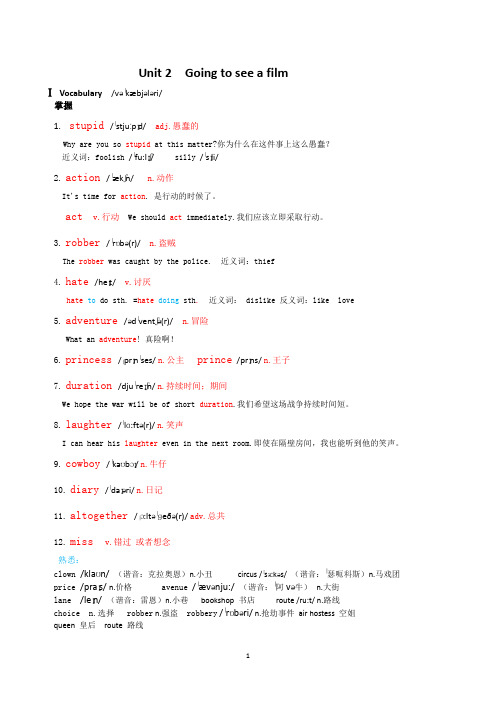
Unit 2 Going to see a filmⅠVocabulary/vəˈkæbjələri/掌握1. stupid /ˈstjuːpɪd/ adj.愚蠢的Why are you so stupid at this matter?你为什么在这件事上这么愚蠢?近义词:foolish /ˈfu:lɪʃ/ silly /ˈsɪli/2.action /ˈækʃn/ n.动作It's time for action. 是行动的时候了。
act v.行动We should act immediately.我们应该立即采取行动。
3.robber /ˈrɒbə(r)/ n.盗贼The robber was caught by the police. 近义词:thief4.hate /heɪt/ v.讨厌hate to do sth. =hate doing sth. 近义词: dislike 反义词:like love5.adventure /ədˈventʃə(r)/ n.冒险What an adventure! 真险啊!6.princess /ˌprɪnˈses/ n.公主prince/prɪns/ n.王子7.duration /djuˈreɪʃn/ n.持续时间;期间We hope the war will be of short duration.我们希望这场战争持续时间短。
ughter /ˈlɑ:ftə(r)/ n.笑声I can hear his laughter even in the next room.即使在隔壁房间,我也能听到他的笑声。
9.cowboy /ˈkaʊbɔɪ/ n.牛仔10.diary /ˈdaɪəri/ n.日记11.altogether /ˌɔ:ltəˈɡeðə(r)/ adv.总共12.miss v.错过或者想念熟悉:clown/klaʊn/ (谐音:克拉奥恩)n.小丑circus /ˈsɜ:kəs/ (谐音:ˈ瑟呃科斯)n.马戏团price /praɪs/ n.价格 avenue /ˈævənju:/ (谐音:ˈ阿və牛)n.大街lane /leɪn/ (谐音:雷恩)n.小巷bookshop 书店route /ru:t/ n.路线choice n.选择 robber n.强盗 robbery/ˈrɒbəri/ n.抢劫事件air hostess 空姐queen 皇后route 路线ⅡPhrase /freɪz/1.take a look=have a look 看一看let's take/have a look around the exhibition./ˌeksɪˈbɪʃn/ n.展览咱们看看展览吧。
上海牛津英语7A-Unit 2 Our animal friends - Exercise 2 -
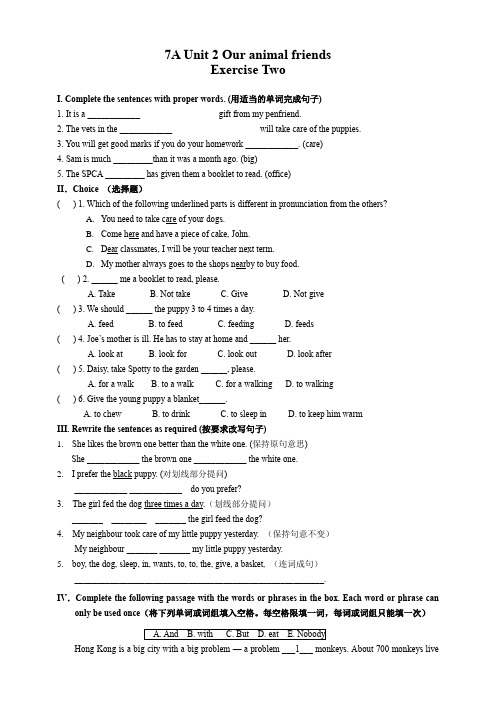
7A Unit 2 Our animal friendsExercise TwoI. Complete the sentences with proper words. (用适当的单词完成句子)1. It is a ____________ gift from my penfriend.2. The vets in the ____________ will take care of the puppies.3. You will get good marks if you do your homework ____________. (care)4. Sam is much _________than it was a month ago. (big)5. The SPCA _________ has given them a booklet to read. (office)II.Choice (选择题)( ) 1. Which of the following underlined parts is different in pronunciation from the others?A.You need to take care of your dogs.e here and have a piece of cake, John.C.Dear classmates, I will be your teacher next term.D.My mother always goes to the shops nearby to buy food.( ) 2. ______ me a booklet to read, please.A. TakeB. Not takeC. GiveD. Not give( ) 3. We should ______ the puppy 3 to 4 times a day.A. feedB. to feedC. feedingD. feeds( ) 4. Joe’s mother is ill. He has to stay at home and ______ her.A. look atB. look forC. look outD. look after( ) 5. Daisy, take Spotty to the garden ______, please.A. for a walkB. to a walkC. for a walkingD. to walking( ) 6. Give the young puppy a blanket______.A. to chewB. to drinkC. to sleep inD. to keep him warmIII. Rewrite the sentences as required (按要求改写句子)1.She likes the brown one better than the white one. (保持原句意思)She ____________ the brown one ____________ the white one.2.I prefer the black puppy. (对划线部分提问)____________ ____________ do you prefer?3. The girl fed the dog three times a day.(划线部分提问)_______ ________ _______ the girl feed the dog?4. My neighbour took care of my little puppy yesterday. (保持句意不变)My neighbour _______ _______ my little puppy yesterday.5.boy, the dog, sleep, in, wants, to, to, the, give, a basket, (连词成句)_________________________________________________________.IV.Complete the following passage with the words or phrases in the box. Each word or phrase can only be used once(将下列单词或词组填入空格。
牛津初中英语AUnitVocabulary教案
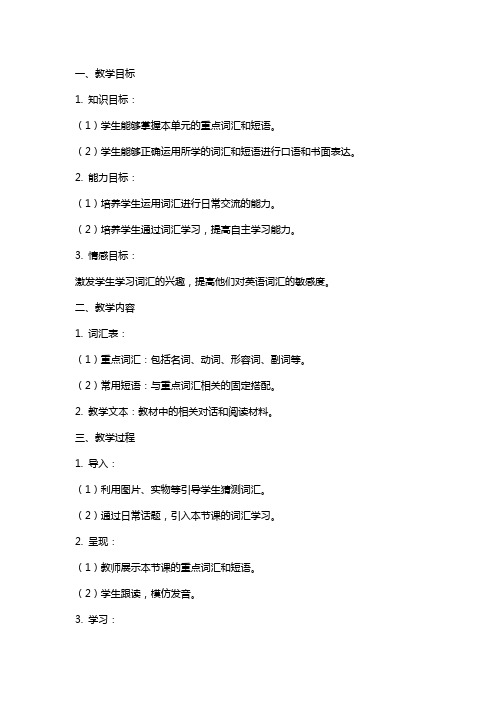
一、教学目标1. 知识目标:(1)学生能够掌握本单元的重点词汇和短语。
(2)学生能够正确运用所学的词汇和短语进行口语和书面表达。
2. 能力目标:(1)培养学生运用词汇进行日常交流的能力。
(2)培养学生通过词汇学习,提高自主学习能力。
3. 情感目标:激发学生学习词汇的兴趣,提高他们对英语词汇的敏感度。
二、教学内容1. 词汇表:(1)重点词汇:包括名词、动词、形容词、副词等。
(2)常用短语:与重点词汇相关的固定搭配。
2. 教学文本:教材中的相关对话和阅读材料。
三、教学过程1. 导入:(1)利用图片、实物等引导学生猜测词汇。
(2)通过日常话题,引入本节课的词汇学习。
2. 呈现:(1)教师展示本节课的重点词汇和短语。
(2)学生跟读,模仿发音。
3. 学习:(1)学生通过教材中的对话和阅读材料,理解词汇的用法。
(2)学生通过小组合作,讨论词汇的搭配和用法。
4. 练习:(1)教师设计不同类型的练习,巩固所学词汇。
(2)学生进行口头和书面练习,展示所学成果。
5. 拓展:(1)学生进行词汇接龙游戏,扩展词汇量。
(2)学生尝试用所学词汇编写小故事或对话。
四、教学评价1. 课堂参与度:观察学生在课堂上的发言和互动情况。
2. 练习完成情况:检查学生口头和书面练习的准确性。
3. 课后作业:评估学生课后作业的完成质量和创新性。
五、教学资源1. 教材:牛津初中英语教材。
2. 辅助材料:词汇卡片、图片、实物等。
3. 技术资源:多媒体教学设备。
六、教学步骤Step 1: Lead-in教师通过展示一幅图片或提出一个问题,引起学生对主题的兴趣。
学生进行思考并发表自己的观点。
Step 2: Presentation教师介绍本节课的主题和目标。
教师展示本节课的重点词汇和短语,并解释其意义和用法。
学生跟读,模仿发音。
Step 3: Learning学生通过教材中的对话和阅读材料,理解词汇的用法。
学生通过小组合作,讨论词汇的搭配和用法。
Step 4: Practice教师设计不同类型的练习,巩固所学词汇。
牛津英语7A_Unit_2_全部教案

牛津初中英语教学案牛津初中英语(7A)Unit 2 My Day第一课时Welcome to the unit设计的基本理念:根据新课标培养学生自主、合作、探究精神、突出语言使用水平培养的理念而设计。
课型:对话、句型操练课1、技能目标:培养学生灵活使用本课所学词汇、句型来表述日常活动的对话水平。
2、知识目标:①重点单词:fun, sleep, a.m, p.m, homework, model, make, newspaper, film, mum, should, right.②重点短语:wake up, go to sleep, have assembly,…③重点句型:I get up at 6 a.m every morning.When do you get up?When do you go to school?What do you do after school?3、情感目标:通过学习谈论日常安排和活动之后,学生能够为自己制定一个合理的学习和生活的日常活动安排表。
4、策略目标:通过日常生活时间来描述自己或他人的日常活动,并学习使用词汇。
5、文化意识目标:时间表达,逻辑思维,做事有条理,时间观点强,珍惜光阴。
课堂教学模式:一学一练一测和任务型教学课前准备:1、准备一个钟。
2、教师或学生画一些日常活动的图片。
3、教师制作日常生活和学习的表格。
4、让学生预习新单词。
教学过程:Step 1: Revision.Review the names of meals and the different activities presented on page 19. Divide the class into groups of four. Brainstorm the topic of daily life activities. Ask Ss to draw an activity if they do not know the word in English.Step 2: Presentation.Talk to Ss about daily routines and activities.Say: I get up at 6 a.m in the morning.When do you get up? etcStep 3: Ask Ss to sort their activities into different sections:Leisure — Sports — Eating — school.Teacher tells Ss to write down the day and time when they typically do these activities. As you go around the class, provide help with vocabulary.Step 4: Each group writes the four lists on the board. Ss can copy the activities they want to include in their diary.Step 5: Work in pairs to talk about their partner’s diary. You can use the following sentence patterns:a. When do you go to school /…/ ?b. Do you go to school by bus /…/ ?c. What do you do after school /…/ ?Step 6: Learn Vocabulary.a. P23 Go through Part A and read the words and phrases correctly. Attention to their pronunciation.b. Ss complete the task and check answers. Encourage Ss to memorize the collocations Part B.c. Let Ss go through Part B and explain the context. Ask Ss to do the task on their own, then check answers. Ss correct any mistakes and the teacher explains something if necessary.d. Divide the class into pairs. Let Ss read the conversation and get some pairs to act it out.Step 7: Practice — task.课堂教学任务。
Unit2+单词课件-2022-2023学年高中英语牛津译林版(2020)必修第一册
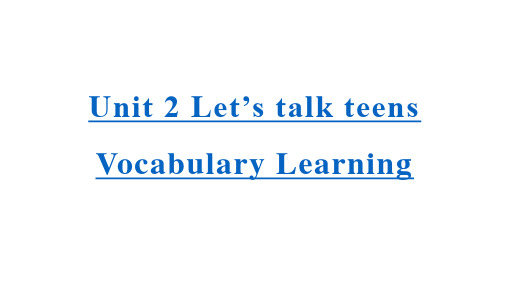
normal [ˈnɔ:ml]adj.正常的,一般的 n.常态,通常标准 return to normal 恢复正常 below/above normal 低于/高于正常标准 normally adv.通常,正常地,平常地 abnormal adj.不正常的,反常的
mental [ˈmentl] adj.思想的,精神的,智力的 mentally adv.精神上,智力上,思想上 physical adj.身体的,客观存在的,物质的 physics [ˈfɪzɪks]物理学 adult [ˈædʌlt] n.成年人 adulthood n.成年 childhood [ˈtʃaɪldhʊd] 童年;幼年时代
see eye to eye with sb (on sth) (在某事上)与某人看法一致 keep an eye on 照看,留意 the apple of her parents’ eye 掌上明珠 teenager n.青少年 teenage adj.十几岁的,青少年的 tension n.紧张关系;紧张;拉伸 tense adj. 拉紧的精神压力,紧张;强调 vt.强调,着重 stressed adj.焦虑不安的;心力交瘁的 stressful adj.压力重的;紧张的 editor [ˈedɪtə(r)]n.主编,编辑;剪辑师 edit v.编辑,校订
skin [skɪn] n.皮肤;(兽)皮,毛皮
《学法》P56
design [dɪˈzaɪn] vt.设计;制订 n.设计;设计艺术 design sth to do sth 为了做……而设计…… be designed for 为……而设计 by design 故意地 designer n.设计师 forum [ˈfɔ:rəm] n.论坛,讨论会;公共集会场所
7A英语Unit 2 Daily lifeVocabulary7年级上 深圳
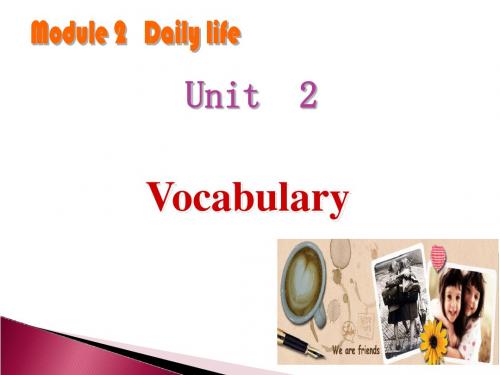
注意:因为……,所以……”时,用了 because就不能再用so,用了so就不能再用 because。请注意下面汉语句子的英语译法:
因为他病了,所以没去上学。 误:Because he was ill, so he didn't go to school. 正:Because he was ill, he didn't go to school. 正:He was ill, so he didn't go to school. 句型结构 1.“原因+so+结果”
so _____ John's bike was broken, ______he was late / for school yesterday
在英文表达中,有了"因为"(because),就不用"所 以"(so); 有了"所以"(so),就不用"因为" (because)。
1). so“如此”、“因此”、“所以”意思。 —I don't think so. —I hope so.
baseball basketball tennis volleyball
6. ride
v. 骑;驾驶
ride - rode(过去时)- ridden
Few people ride bikes in this area.
Xiao Ming rode to school yesterday. xiao Ming went to school by bike yesterday. ride =go to .... by bike
辨析: composition:学生的作文。 article:多指在报刊、杂志上发表的非文艺性 的文章。 essay:评论、讽刺性杂文等。 paper:指高等学校的学期论文,或学校里的 作文
牛津英语7A知识点汇总
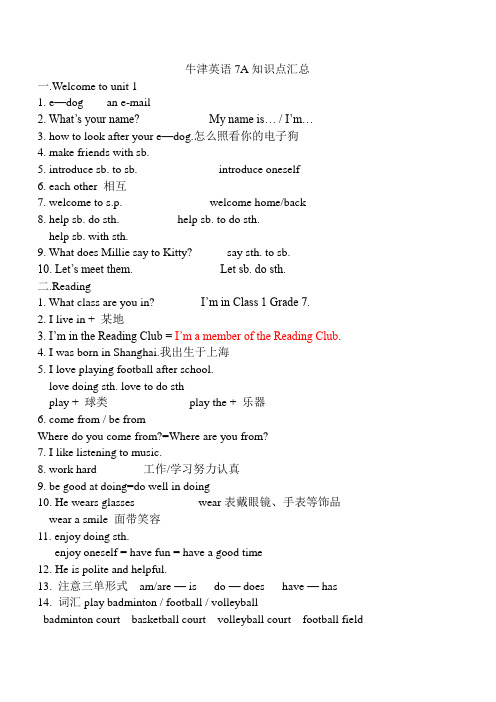
牛津英语7A知识点汇总一.Welcome to unit 11. e—dog an e-mail2. What’s your name? My name is… / I’m…3. how to look after your e—dog.怎么照看你的电子狗4. make friends with sb.5. introduce sb. to sb. introduce oneself6. each other 相互7. welcome to s.p. welcome home/back8. help sb. do sth. help sb. to do sth.help sb. with sth.9. What does Millie say to Kitty? say sth. to sb.10. Let’s meet them. Let sb. do sth.二.Reading1. What class are you in? I’m in Class 1 Grade 7.2. I live in + 某地3. I’m in the Reading Club = I’m a member of the Reading Club.4. I was born in Shanghai.我出生于上海5. I love playing football after school.love doing sth. love to do sthplay + 球类play the + 乐器6. come from / be fromWhere do you come from?=Where are you from?7. I like listening to music.8. work hard 工作/学习努力认真9. be good at doing=do well in doing10. He wears glasses wear表戴眼镜、手表等饰品wear a smile 面带笑容11. enjoy doing sth.enjoy oneself = have fun = have a good time12. He is polite and helpful.13. 注意三单形式am/are — is do — does have — has14. 词汇play badminton / football / volleyballbadminton court basketball court volleyball court football field三.Grammer1.一般现在时用法、结构、伴随状语、频度副词、三单形式变化规则。
初中英语牛津版七年级上Unit6Vocabulary

Do you know these clothes? jumper
skirt T-shirt
shorts
suit jacket
Do you still remember?
1. Amy is wearing a yellow ________ (套头衫).
jumper
2. Simon is wearing a pair of black
ong hite
Performance
Our fashion show
Today we are going to have a fashion. Some classmates are going to show us some clothes.
After that, please describe their clothes.
Now please enjoy the show.
How cool!
Work in groups
Model: S1: What is … wearing? S2: She is wearing a skirt. S1: What colour is it? S2: It’s white. S1: What’s it made of? S2:It’s made of cotton. S1: Is it comfortable? S2: Yes, it is.
初中英语牛津版7A
Unit 6
Fashion
Vocabulary
Revision
1. Kitty from Class 1, Grade 7
来自7年1班的凯蒂
2. welcome to our fashion show
欢迎来我们的时装秀 3. want to raise money for Project Hope 想要筹钱给希望工程
Unit 2 Vocabulary 重点词汇讲解课件-高一上学期英语人教版(2019)必修第一册
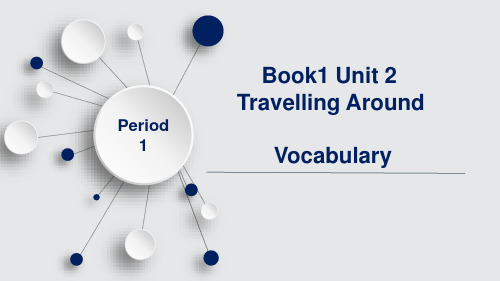
到)learning how to read and write. (2016天津阅读) 3.The same punishment applies to (适用于) failing to provide specimens(样
本) for breath, blood or urine tests without good excuse. (2011福建)
词汇概览
重点词汇
词形变换
巩固练习
2. recognise/recognize
vt.认出,辨认出(不用于进行时);承认,认可;意识到
词类转换:
recognition n. 认出,识别; 承认,认可; 赞扬,表彰
常见短语搭配
recognise...as... 承认,认可
词汇概览
重点词汇
重点短语
巩固练习
A. attempts B. requests C. doubts D. promises
词汇概览
重点词汇
重点短语
巩固练习
5.credit
n.信用;学分;赞扬;赊账;v. 把 .. 归功于 常见短语搭配:
to one's credit 为...增光,值得赞扬
To thier credit, the four countries do work together in some areas, but they still have differrent institutions.
D.观看,看
5. If we go on a trip abroad, we can broaden our view and gain knowledge we cannot get from books.(2016全国)
牛津英语 7A Unit 4 VocabularyUnit 3 Integrated skills & Study skills

Unit 3 Integrated skills & Study skills 一、翻译短语1.度假3.看舞狮5.吃传统中国食物2.在夜里4.得到许多礼物6.从晚上9点到午夜二、根据句意及中文提示填写下列单词1. We always get some (钱)at Chinese New Year.2. Are there any Halloween (聚会)in Beijing?3. There are lots of (有趣)things here.4. It is my (第三) time to see the movie.5. There will be __ (烟火)in Chinatown.6. Tomorrow is my birthday, I feel very (激动).7. The 9-month-old baby has four __ (牙齿).8. I can’t remember the__ (日期)of it.三、用所给动词的适当形式填写1. Our party (not start) at four o’clock. It starts at five.2. Let’s__ (celebrate) Halloween.3. He always (dress) up at Children’s Day.4. Who (give) you presents on your birthday every year?5. Lucy, (write) the sentence on the flash card.6. If you want (make) a pumpkin lantern, you should (cut) out some shapes (make) the eyes, the sharp teeth.四、完成句子1. 你们在加拿大为万圣节做些什么?____________ do you do _____________ Halloween in Canada?2. 这是我第一次举行派对。
牛津初中英语7A_Unit1--Unit6知识点归纳

7AUnit 1Comic strip (卡通漫画)This is me !I love this e-dog.我非常喜欢这只电子狗。
★这里的e-dog意思是electronic dog。
electronic可译为“电子的”。
如:e-mail(电子邮件)。
How to look after your e-dog如何照料你的电子狗★look after的意思是“照看,照料”。
如:(a)Look! Lily is looking after her little brother.看,丽莉正在照料她的小弟弟呢!(b)Could you help me look after my cat?你能帮忙照料一下我的小猫吗?Making friends at your new school在新学校交朋友★make friends可译为“交朋友”。
与某人交朋友可表达为:make friends with somebody(a)Tom made many new friends in China.汤姆在中国结识了许多新朋友。
(b)I find it easy to make friends with Chinese people.我觉得跟中国人交朋友很容易This is the first day at Beijing Sunshine Secondary School. The students are introducing themselves to each other. They are going to write about themselves.这是北京阳光中学开学的第一天。
学生们正在互相作自我介绍。
他们要写自我简介。
Write about yourself for the class notice board.写一段文字简单介绍一下自己,这份简介将张贴在班级布告牌上。
Welcome to the unit (导入)A Meeting new friendsThe students are starting school at Beijing Sunshine Secondary School and this is their first English lesson. They are introducing themselves to each other.北京阳光中学的学生们开学了。
- 1、下载文档前请自行甄别文档内容的完整性,平台不提供额外的编辑、内容补充、找答案等附加服务。
- 2、"仅部分预览"的文档,不可在线预览部分如存在完整性等问题,可反馈申请退款(可完整预览的文档不适用该条件!)。
- 3、如文档侵犯您的权益,请联系客服反馈,我们会尽快为您处理(人工客服工作时间:9:00-18:30)。
Presentation
newspaper n. 报纸 read newspapers TV n. 电视机 on TV, watch TV adj. 许多的 much watch too much TV model n. 模型 make model planes
listen to the music
7 A Vocabulary
Revision Fill in the blanks Millie is at Beijing Sunshine in Secondary School. She is ____ Class 1, Grade 7. She likes her classroom because it’s big and ______. clean best Amy is Millie’s _____friend. And they at like sitting under the trees _____ ______ lunchtime each _________. They always chat with_____ games other ______or play______.
Translate the following into English. 1.我每天看报纸。 I read newspapers every day. 他周末看电视。 He watches TV at the weekend 看黑板.能看见吗? Look at the blackboard?
Can you see?
make Shirley: Does Millie (1)________ model planes? reads Amy: No, she doesn’t. She (2) _________ books. listen to Shirley: Does Sandy (3) ____________ music? Amy: Yes, she does. She also (4) _________ plays badminton. write Shirley: Do Simon and Daniel (5)__________ letters? write Amy: No, they don’t.They (6)_______e-mails. watch Shirley: Do you (7) __________ football matches on TV? Amy: No, I don’t. My mum says we shouldn’t watch (8) ________ too much TV. listen to Shirley: Yes. We should (9)__________ her.
Have a discussion
What should we do in class? What shouldn’t we do in class? What should you do as a student? What should you do as your parents’ child?
listen to the teacher
play badminton
play
listen to
make
watch
read
write
Discussion What do you like to do after school?
Do you like to play badminton/ listen to the radio/ make model planes/ read newspapers/ write e-mails/ watch TV after school?
Does she / he like to watch TV? If you watch too much TV, what will your parents say to you?
should modal verb 应该 should not =shouldn’t 不应该 listen to sb. e.g. We should listen to the teacher carefully in class. You should listen to your parents because they are right. We shouldn’t watch too much TV.
do ______ Every morning they ____ morning ________ first. Millie’s ________ lessons exercises favorite are Chinese and English, Every day spends doing Millie _______ 2 hours ______ her homework. Every Tuesday and Friday Millie goes plays theReading_____. She sometimes _____ ______ Club volleyball _____ Amy. Amy is a good with swimmer ________. We have a good time at school.
中考题型链接 根据所给单词的首字母或汉语意思 填空,每格一词: 填空,每格一词:
laying 1. Simon likes p______ computer games. 2. Do you eat l____ at home or at school? unch 3. Annie likes swimming very much, and she is a good s_______. wimmer
8. My mum says we shouldn’t (不应) ________ 不应 不应) watch too much TV. 9. Daniel practises (练习)playing ________ 练习) 练习 badminton every Friday. 10. Millie and her classmates do afterschool ________ (活动 at 4 p.m. in 活动 activities 活动) the afternoon.
read 看(书,报,杂志等有文字性的东西) watch 看(电视,比赛等活动性的) look 看(强调过程) see 看(强调结果)
2.你在做什么?我在做模型飞机。 What are you doing? I’m making a model plane. 他在做什么?他在做家庭作业。 What is he doing? He’s doing his homework. 你长大想做什么?我长大想做舞蹈家。 What are you going to be when you grow up? I’m going to be a dancer. 你们家谁做饭?我妈妈。 Who cooks at your home? My mother.
Thank you!
Goodbye!
4. PeteБайду номын сангаас listens to the r____ every day. adio 5. They don’t write letters to each other. They send e_____ to each other. -mails 6. Ricky makes model (模型)planes _____ 模型 模型) after school. 7. My father always reads newspapers __________ (报纸)after supper. 报纸) 报纸
